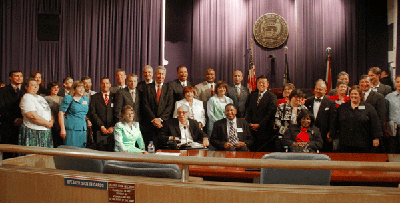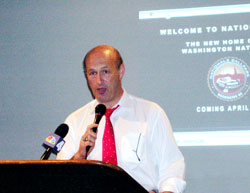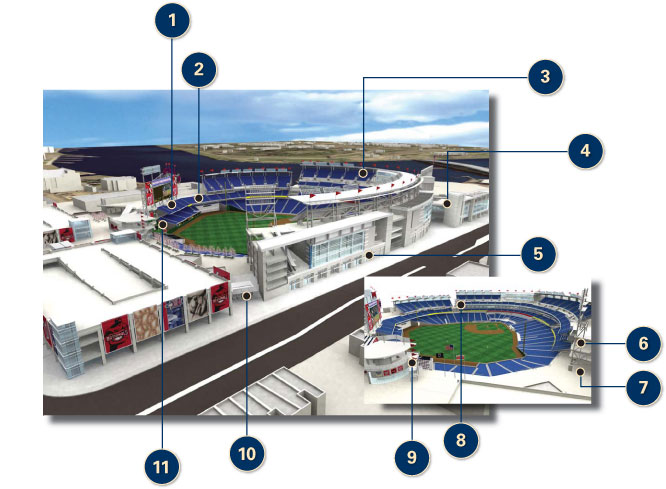.jpg) |
Disability Rights |
October 2007 Issue Twenty One Disability Rights Online News is a bi-monthly update about the Civil Rights Division’s activities in the area of disability rights. The Division enforces laws prohibiting discrimination based on disability in employment, housing, access to businesses serving the public, access to government programs and services including voting and public transportation, and unconstitutional conditions in institutions of confinement. In this Issue: ADA |
On July 26, 2007, Wan J. Kim, Assistant Attorney General for the Civil Rights Division, and Deputy Assistant Attorney General Loretta King held a ceremony with city officials in New Orleans, Louisiana, to sign an amended settlement agreement ensuring that new and renovated city buildings will be accessible. Assistant Attorney General Kim also announced a similar agreement with Harrison County, Mississippi, which includes the cities of Gulfport and Biloxi. Both agreements address the jurisdictions’ efforts to rebuild after Hurricane Katrina destroyed many buildings and facilities two years ago. They also call for development of new emergency management plans that include provisions for accommodating people with disabilities. Under the agreements, the Department will provide technical assistance and other professional services by architectural and design consultants to assist the City of New Orleans and Harrison County in their efforts to rebuild and provide facilities that are accessible to people with disabilities. These services include: reviewing plans for new facilities and modifications to existing ones; providing training on ADA architectural requirements for key city and county personnel and for local architects, engineers, and contractors; and providing consultation to business owners, landlords, contractors, and others who are designing or rebuilding private (nongovernment) facilities within the city and county.
Project Civic Access is the Department’s wide-ranging initiative to work cooperatively with local governments to ensure that people with disabilities have an equal opportunity to participate in civic life, a fundamental part of American society. |
DEPARTMENT TO HOLD MULTI-FAMILY HOUSING ACCESS FORUM IN MIAMI The Department will host a forum on accessibility in the construction of multi-family housing on Thursday, November 29, at the Radisson Hotel in Miami, Florida. The program is part of a nationwide “Multi-Family Housing Access Forum” initiative that the Assistant Attorney General for the Civil Rights Division launched in 2005 to help building professionals understand their legal obligations under the federal Fair Housing Act’s accessibility requirements and to celebrate partnerships that have successfully produced accessible multi-family housing in which everyone profits – developers and consumers alike. The anticipated audience will consist of building professionals, including architects and engineers, as well as developers, government officials, and advocates for individuals with disabilities. To learn more about the program and the Department’s fair-housing enforcement activities, visit www.usdoj.gov/crt/housing/fairhousing/. To receive an invitation to the November event, email the Department at accessforum@usdoj. gov. EVENT HIGHLIGHTS ACCESSIBILITY OF NEW WASHINGTON NATIONALS BALLPARK
On August 1, 2007, the Department held an event at RFK stadium in Washington, D.C. to provide the disability community and media with information about the accessible features planned for the Washington Nationals’ new ballpark, scheduled to open in the spring of 2008. Department staff have been working with all entities involved in the design, construction, and operation of the new ballpark to ensure that it complies with the ADA in all respects. At the event, Assistant Attorney General Wan J. Kim gave remarks about the ADA anniversary, highlighted the work of the Disability Rights Section, and acknowledged the commitment by those involved in designing, constructing, and operating the new ballpark to achieve full compliance with the ADA. Principal Deputy Assistant Attorney General Rena Comisac was the master of ceremonies for the event, which included remarks by Washington Nationals President Stan Kasten, Deputy Executive Director of Paralyzed Veterans of America Maurice Jordan, Chief of Staff of the D. C. Sports & Entertainment Commission Warren Graves, and HOK design architects Ed Roether and Pat Tangen. The HOK design architects provided a virtual tour of the new ballpark, highlighting the wheelchair seating, accessible routes, concessions, luxury suites, ticket windows, restaurants, bars, and lounges, all of which are designed to comply with ADA requirements. Description of the accessible features planned for the new Nationals ballpark
NATIONWIDE COMPANY OFFERING TUTORING SERVICES FOR SCHOOL-AGED CHILDREN WILL PROVIDE SIGN LANGUAGE INTERPRETERS On September 27, 2007, the Department entered into a settlement agreement with Sylvan Learning Centers of Baltimore, Maryland, resolving a complaint alleging that it had refused to provide a sign language interpreter to enable a prospective student who is deaf to participate in its tutoring program. Sylvan operates a variety of tutoring programs for students in grades K-12. The agreement covers more than 200 centers owned by Sylvan nationwide. Sylvan has agreed to provide auxiliary aids and services, including qualified sign language interpreters, to students who are deaf or hard of hearing when necessary to ensure effective communication; to adopt and incorporate into its operations manual an effective communication policy for students who are deaf or hard of hearing; to distribute the policy to current and new staff; to compile and maintain a list of available sign language interpreter providers; to post and maintain on its Internet website and in a prominent location in the public areas of each of its centers its effective communication policy; to provide staff training on the ADA and Sylvan’s obligations to provide effective communication; to establish, implement, publicize, and monitor a grievance procedure; to pay $1,000 in compensatory damages to the prospective student; and to pay a civil penalty of $25,000.NEW MEXICO ATTORNEY AGREES TO PROVIDE SIGN LANGUAGE INTERPRETERS On August 9, 2007, Joseph David Camacho, an attorney in Albuquerque, New Mexico, signed a settlement agreement with the Department to ensure effective communication with clients with disabilities, including providing qualified sign language interpreting services when necessary for effective communication. The agreement resolves a complaint filed with the Department by the National Association of the Deaf on behalf of Carolyn Tanaka, who is deaf and uses sign language for communication. It alleged that Mr. Camacho had refused to secure a qualified sign language interpreter as needed to assist Ms. Tanaka in a lawsuit in which he was her attorney, that he withdrew from the case leaving her without counsel, and that the case was dismissed due to her failure to respond to discovery. Allegedly, Mr. Camacho attempted to communicate with his client through written notes, e-mails, and sign language interpretation by her nine-year old son. Under the agreement, the law office will adopt and enforce a policy on effective communication with clients and their companions who are deaf or hard of hearing, including providing interpreters and other auxiliary aids free of charge when needed. Mr. Camacho also agreed to pay the former client $1,000 in compensatory damages. GEORGIA MOTEL AGREES TO ADMIT SERVICE ANIMALS On July 27, 2007, the Department entered into a settlement agreement with the former and current owners of a Travelodge motel in Dalton, Georgia, resolving a complaint filed by a person who is blind alleging that the former owner of the motel refused service to him because he was accompanied by a service animal. In response to the investigation, the current owner agreed to adopt, maintain, implement, and enforce a policy on the treatment of customers using service animals, to provide a copy of the policy to each employee, and to post the policy in a conspicuous public area of the motel near the reception desk. The owner will also post a large print notice in the lobby welcoming people with disabilities accompanied by service animals. The owner will train all current employees regarding their obligations under the service animal policy and under the ADA with respect to service animals. New employees will be trained on the motel’s service animal policy within 24 hours of first reporting to work. In addition, the former owner of the motel agreed to pay the complainant $5,000 in damages and to pay a civil penalty of $1,000. CALIFORNIA YMCA WILL ACCOMMODATE CHILDREN WITH AUTISM IN AFTER-SCHOOL CHILD CARE PROGRAMS On August 6, 2007, the Department signed a settlement agreement with the West End YMCA in Ontario, California, resolving a complaint that the agency had failed to make reasonable policy modifications necessary to afford a child with autism a full and equal opportunity to participate in the YMCA’s after-school child care program and then terminated the child from the program because of his autism. The agreement covers associated YMCA branches in Ontario, Upland, Chino, and Rancho Cucamonga, California. It requires the agencies to adopt, publish, and implement procedures for evaluating reasonable modification requests; to provide ADA training to those involved in admission and retention decisions; and to pay compensatory damages to the complainant. BALTIMORE HOUSING AUTHORITY WILL DISTRIBUTE OVER $1 MILLION IN DAMAGES TO VICTIMS OF DISABILITY DISCRIMINATION On August 22, 2007, the federal court in Maryland approved the pro rata distribution of over $1 million in monetary damages among 756 individuals who were identified through a claims process as part of the resolution of a lawsuit by the Department against the Housing Authority of Baltimore City (HABC) alleging a pattern or practice of discrimination against people with disabilities. The lawsuit alleged that HABC had violated the Rehabilitation Act of 1973, the ADA, and the Fair Housing Act by refusing to admit non-elderly people with disabilities; failing to make its public housing units, common areas, and administrative offices accessible; and failing to provide sufficient assistance to people with physical or mental disabilities who sought to rent private units through HABC’s Section 8 Housing subsidy program. On December 20, 2004, the court entered a consent order that settled the lawsuit, together with a separate lawsuit filed by three individuals with disabilities who were represented by the Maryland Disability Law Center, and required HABC to establish a $1 million victim compensation fund and implement changes to its housing facilities, programs, policies, and practices. NATIONAL PROVIDER OF RETIREMENT HOUSING AGREES TO DISMANTLE DISCRIMINATORY POLICIES On August 27, 2007, a federal court in California approved a consent decree resolving the Department’s lawsuit against Chicago-based Covenant Retirement Communities, Inc., and its subsidiaries. The complaint alleged that this nationwide provider of retirement housing violated the Fair Housing Act by employing policies that required residents who use motorized mobility aids (e.g., motorized wheelchairs and scooters) to obtain personal liability insurance, demonstrate their competence at operating the motorized device, and provide physicians’ certifications of need. The defendants also barred residents and visitors from using mobility aids in certain common areas, including dining rooms, and steered people with mobility impairments from independent living to assisted living. The agreement dismantles the discriminatory policies and calls for employee training, a nondiscrimination policy, record keeping, and monitoring. Additionally, defendants will establish a $530,000 settlement fund for people who may have been injured by their policies and will pay $250 to each resident who was forced to demonstrate their competence at operating their mobility device (along with any additional damages they may have suffered). “This agreement will ensure that residents with disabilities are not denied equal access to their housing communities,” said Assistant Attorney General Wan J. Kim. “The Justice Department will continue its vigorous enforcement of all the fair housing laws. ” The facilities that were employing these policies are: Covenant Village of Turlock, Turlock, California; Mount Miguel Covenant Village, Spring Valley, California; The Samarkand, Santa Barbara, California; Covenant Village of Colorado, Westminster, Colorado; Covenant Village of Cromwell, Cromwell, Connecticut; Covenant Village of Florida, Plantation, Florida; Covenant Village of Northbrook, Northbrook, Illinois; The Holmstad, Batavia, Illinois; Windsor Park Manor, Carol Stream, Illinois; Covenant Home of Chicago, Chicago, Illinois; Covenant Village of the Great Lakes, Grand Rapids, Michigan; Covenant Village of Golden Valley, Golden Valley, Minnesota; Bethany Covenant Village, Minneapolis, Minnesota; Irvington Village, Portland, Oregon; and Covenant Shores, Mercer Island, Washington. The case originated when a retired couple filed discrimination complaints with the U. S. Department of Housing and Urban Development (HUD). HUD conducted an investigation and referred the matter to the Justice Department. MISSOURI THEATER AND CAFE AGREE TO RESOLVE ACCESSIBILITY PROBLEMS On August 30, 2007, the Department entered into a settlement agreement with the Mickey Gilley’s Theatre and Mickey’s Texas Cafe in Branson, Missouri. This matter was initiated as a compliance review a number of years ago during the course of investigating several other entertainment venues in the Branson, Missouri, area. The Department identified numerous violations of the ADA Standards for new construction and alterations at the theatre as well as previously existing architectural barriers at the cafe. Gilley’s has agreed to make changes to wheelchair seating locations, toilet rooms, parking, and certain backstage areas in the theatre, and to remove numerous barriers to access at the cafe. LONG ISLAND HOUSING DEVELOPMENT COMPANY AND ARCHITECT SUED FOR VIOLATING FAIR HOUSING ACT On August 28, 2007, the Department filed a federal lawsuit in Central Islip, New York, against Sayville Development Group LLC and Stephen Ray Fellman for violating the Fair Housing Act. Sayville is the developer of a multi-family housing complex in Sayville, New York, called Sayville Commons, which is a rental community for residents aged 55 and older. Fellman is the architect who provided architectural and engineering services for the construction of Sayville Commons. The complaint also names the current owner of Sayville Commons, Home Properties Sayville LLC, as a defendant. According to the Department’s complaint, Sayville Commons, a 342-unit complex with 171 ground floor units, violates the Fair Housing Act because it does not provide appropriate access to people with disabilities. In particular, the complaint alleges that the common and public areas of Sayville Commons are not readily accessible to people with disabilities; the doors in ground floor units are not wide enough to allow passage by people who use wheelchairs, and the ground floor units lack accessible routes into and through the units. The complaint further alleges that ground floor units do not have usable kitchens and bathrooms for people who use wheelchairs. The lawsuit seeks injunctive relief requiring Sayville Commons to be brought into compliance with the Fair Housing Act, damages to compensate all people harmed by defendants’ discriminatory practices, and civil penalties to vindicate the public interest. “This lawsuit seeks to ensure that people with disabilities are not denied equal access to fair housing,” said Assistant Attorney General Wan J. Kim. “The Justice Department will continue its vigorous enforcement of all the fair housing laws.” “Persons with disabilities and those who use wheelchairs are entitled to the protections of the Fair Housing Act, including readily accessible common and public areas, access into and through their units and usable facilities,” stated Roslynn R. Mauskopf, U.S. Attorney for the Eastern District of New York. “Developers and architects will be held accountable for failing to extend these basic protections to our older, disabled citizens who need them most.” CONNECTICUT LANDLORD SUED FOR REFUSING TO ALLOW TENANT TO KEEP A SERVICE ANIMAL On August 1, 2007, the Department filed a federal lawsuit in Hartford, Connecticut, alleging disability discrimination by the owner of a single-family home in Windsor Locks. The complaint alleges that Mahmoud M. Hussein violated the Fair Housing Act by refusing numerous requests by a tenant for a reasonable accommodation to allow her to keep a service animal on the premises to treat her daughter’s disabilities. The tenant’s daughter has cerebral palsy, depression, seizure activity, and other disabilities. This case was referred to the Department by HUD following a determination of reasonable cause and an election by the complainant to have the case filed in federal court. The complaint is available on the Department’s web site, www.usdoj.gov/crt/housing/documents/husseincomp.pdf. ALABAMA HOUSING AUTHORITY AGREES TO SETTLE LAWSUIT INVOLVING EVICTION OF A DISABLED TENANT On August 29, 2007, the Ashford Housing Authority and its former executive director agreed to settle the Department’s lawsuit alleging that they discriminated against a tenant who is disabled when they unlawfully evicted him from his apartment. The Housing Authority, which receives federal funding, owns and operates the Magnolia Apartment complex in Houston County, Alabama. In the lawsuit, filed on April 13, 2007, the Department alleged that the defendants violated the Fair Housing Act by terminating the tenancy of a 52-year-old man who has been diagnosed with diabetes, heart disease, and mental illness. The complaint alleged that the Housing Authority executed an extra-judicial (or “self-help”) eviction, in violation of federal regulations that require the Authority to initiate state-court eviction proceedings before re-possessing a public housing tenancy. The consent decree, which still must be approved by the court, requires the defendants to pay $45,000 in compensation to the tenant and two family members who assisted him after he was evicted from his apartment. In addition, the consent decree includes an injunction prohibiting further acts of discrimination, requiring fair housing training, providing for reporting requirements, and requiring the establishment of policies on nondiscrimination, reasonable accommodation, and a complaint process. The case originated when the tenant and family members filed discrimination complaints with HUD. HUD conducted an investigation and referred the matter to the Justice Department. ADA MEDIATION HIGHLIGHTS The ADA Mediation Program is a Department sponsored initiative intended to resolve ADA complaints in an efficient, voluntary manner. Mediation cases are initiated upon referral by the Department when both the complainant and the respondent agree to participate. The program uses professional mediators who are trained in the legal requirements of the ADA and has proven effective in resolving complaints at less cost and in less time than traditional investigations or litigation. Over 78% of all complaints mediated have been resolved successfully. In this issue, we highlight complaints against grocery stores that have been successfully mediated. |
![]()
January 14, 2008


